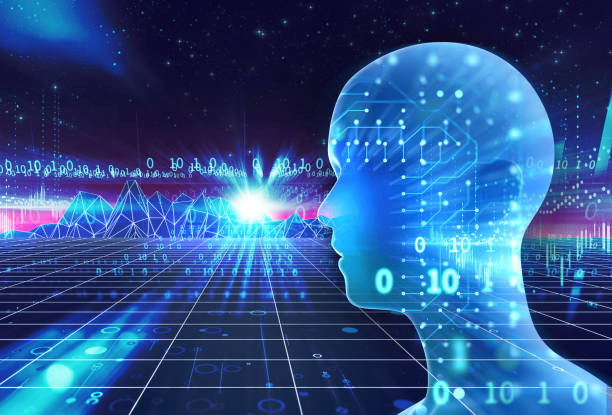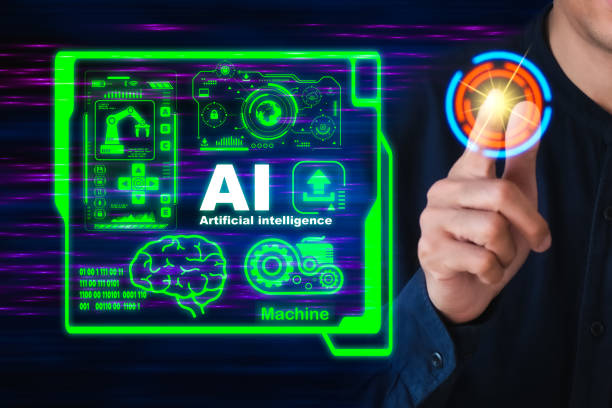What is Artificial Intelligence and What are its Applications?
#Artificial_Intelligence (AI) is a branch of computer science that deals with building machines capable of performing tasks that usually require human intelligence.
These tasks include learning, reasoning, problem-solving, perception, and natural language processing.
The main goal of artificial intelligence is to create systems that can think, learn, and make decisions independently.
The applications of artificial intelligence are very broad and diverse, affecting almost all industries.
In the field of medicine, artificial intelligence is used in disease diagnosis, drug development, and providing personalized care to patients.
For example, artificial intelligence systems can analyze medical images such as MRI and CT Scans with high accuracy and detect abnormalities.
In the automotive industry, artificial intelligence plays a key role in the development of self-driving cars.
These cars use sensors and artificial intelligence algorithms to understand their surroundings and move safely without the need for a human driver.
Artificial intelligence helps in production by optimizing processes, predicting equipment failure, and controlling quality.
In the financial field, artificial intelligence is used for fraud detection, risk management, and providing personalized financial services.
Also, in marketing and sales, artificial intelligence helps companies improve their marketing strategies and offer their products and services more effectively to customers by analyzing customer data.
Are you bothered by losing customers due to an outdated appearance or slow speed of your online store? The specialized Rasaweb team solves these problems with professional online store design!
✅ Increase customer trust and your brand’s credibility
✅ Blazing speed and excellent user experience
Get a free consultation with Rasaweb right now ⚡
Types of Artificial Intelligence Based on Capability
Artificial intelligence can be divided into several main categories based on its capabilities and levels of intelligence.
This classification helps us to have a better understanding of the abilities and limitations of each type of artificial intelligence.
The first category is limited artificial intelligence or Weak AI, which is also called narrow artificial intelligence.
This type of #AI is designed to perform a specific task and performs very well in that limited area.
Examples of limited artificial intelligence include facial recognition systems, email spam filters, and product recommendation systems in online stores.
These systems are only effective in their specific field and cannot perform other tasks.
The second category is general artificial intelligence or General AI, which is also called strong artificial intelligence.
This type of artificial intelligence has cognitive abilities similar to humans and can perform any task that a human is capable of doing.
General artificial intelligence is still under development and there is no complete system with this level of intelligence.
However, extensive research is being done in this area and it is hoped that systems with general artificial intelligence will be built in the near future.
The third category is super artificial intelligence or Super AI, which surpasses human intelligence and can perform any intellectual and creative work better than humans.
This type of artificial intelligence is still just a hypothesis and no example of it exists in the real world.
However, some scientists believe that if super artificial intelligence is realized, it can create huge changes in human life, but at the same time, there are concerns about its potential dangers.
Artificial intelligence based on capability plays an important role in understanding and developing this technology and helps us to better determine our goals and paths ahead.
Key Techniques and Algorithms in Artificial Intelligence
Artificial intelligence uses various techniques and algorithms to solve problems and perform tasks.
Machine Learning is one of the most important of these techniques, which allows systems to learn from data and improve their performance without explicit programming.
In machine learning, algorithms identify patterns and relationships in data using training data and create models based on them that can be used for prediction, decision-making, and other tasks.
Deep Learning is a subfield of machine learning that uses deep neural networks to model data.
These networks consist of multiple layers of nodes (neurons) that are connected to each other and identify complex patterns by processing data.
Deep learning has many applications in various fields such as image recognition, natural language processing, and voice recognition.
Natural Language Processing or NLP is a branch of artificial intelligence that enables systems to understand and process human language.
NLP includes techniques for analyzing texts, translating languages, generating text, and answering questions.
NLP systems are used in various fields such as chatbots, voice assistants, and machine translation systems.
Computer Vision is a branch of artificial intelligence that enables systems to understand and analyze images and videos.
Computer vision includes techniques for object detection, face recognition, motion detection, and 3D scene reconstruction.
Computer vision systems are used in various fields such as self-driving cars, surveillance systems, and medical systems.
Below is a table to show a summary of these techniques:
| Technique | Description | Applications |
|---|---|---|
| Machine Learning | Systems learn from data and improve their performance. | Prediction, decision-making, pattern recognition |
| Deep Learning | Deep neural networks are used to model data. | Image recognition, natural language processing, voice recognition |
| Natural Language Processing | Systems understand and process human language. | Chatbots, voice assistants, machine translation |
| Computer Vision | Systems understand and analyze images and videos. | Self-driving cars, surveillance systems, medical systems |
Click here to preview your posts with PRO themes ››
Applications of Artificial Intelligence in Various Industries
The applications of #Artificial_Intelligence in various industries are very broad and diverse.
In the field of medicine, artificial intelligence is used in disease diagnosis, drug development, and providing personalized care to patients.
Artificial intelligence systems can analyze medical images such as MRI and CT Scan with high accuracy and detect abnormalities.
Also, artificial intelligence can help doctors choose the best treatment method for each patient by analyzing genetic and clinical data.
In the automotive industry, artificial intelligence plays a key role in the development of self-driving cars.
These cars use sensors and artificial intelligence algorithms to understand their surroundings and move safely without the need for a human driver.
Also, artificial intelligence can play a role in improving car safety by detecting hazards and preventing accidents.
In production, artificial intelligence helps optimize processes, predict equipment failure, and control quality.
Artificial intelligence systems can identify patterns in processes by analyzing production data and offer solutions to improve efficiency and reduce costs.
In the financial field, artificial intelligence is used for fraud detection, risk management, and providing personalized financial services.
Artificial intelligence systems can identify suspicious patterns by analyzing financial data and prevent fraud.
Also, artificial intelligence can provide appropriate financial services to each individual by analyzing customer data.
Are you dissatisfied with the low sales of your online store?
Rasaweb is your solution to have a professional and high-selling online store.
✅ Significant increase in sales and income
✅ Easy and enjoyable shopping experience for customers
⚡ Get a free consultation from Rasaweb right now!
Advantages and Disadvantages of Artificial Intelligence
Artificial intelligence, like any other technology, has numerous advantages and disadvantages that should be carefully considered.
One of the greatest advantages of artificial intelligence is increased efficiency and productivity.
Artificial intelligence systems can perform tasks faster and more accurately than humans, which leads to lower costs and increased production.
Also, artificial intelligence can perform dangerous and repetitive tasks, which prevents the risks and fatigue of human labor.
Another advantage of artificial intelligence is the provision of personalized services.
Artificial intelligence systems can provide appropriate services and products to each individual by analyzing customer data, which leads to increased customer satisfaction and increased sales.
Artificial intelligence can play a role in solving complex problems and providing innovative solutions.
Artificial intelligence systems can identify patterns in data by analyzing big data and provide solutions to solve complex problems.
However, artificial intelligence also has disadvantages.
One of the biggest disadvantages of artificial intelligence is job loss.
With the automation of tasks by artificial intelligence systems, many jobs may be lost, which leads to increased unemployment and social inequality.
Also, artificial intelligence can lead to increased discrimination.
If the training data of artificial intelligence systems is biased, the systems may also make discriminatory decisions.
Another disadvantage of artificial intelligence is security and privacy issues.
Artificial intelligence systems can be attacked and steal sensitive data.
Also, artificial intelligence can be used to monitor people and violate their privacy.
Therefore, it is necessary to pay attention to these disadvantages in the development and use of artificial intelligence and provide solutions to reduce them.
The Future of Artificial Intelligence and Its Impact on Our Lives
The future of artificial intelligence is very bright and full of possibilities.
With the advancement of technology, it is expected that artificial intelligence will play a more important role in various fields such as medicine, transportation, production, and financial services.
In the field of medicine, artificial intelligence can help in disease diagnosis, drug development, and providing personalized care to patients.
Artificial intelligence systems can analyze medical images such as MRI and CT Scan with high accuracy and detect abnormalities.
Also, artificial intelligence can help doctors choose the best treatment method for each patient by analyzing genetic and clinical data.
In the transportation industry, artificial intelligence can play a role in the development of self-driving cars and improving the safety and efficiency of transportation systems.
Self-driving cars can understand their surroundings and move safely without the need for a human driver using sensors and #artificial_intelligence algorithms.
Also, artificial intelligence can play a role in improving traffic planning and management and reducing air pollution.
In production, artificial intelligence can help optimize processes, predict equipment failure, and control quality.
Artificial intelligence systems can identify patterns in processes by analyzing production data and offer solutions to improve efficiency and reduce costs.
In the financial field, artificial intelligence can be used for fraud detection, risk management, and providing personalized financial services.
Artificial intelligence systems can identify suspicious patterns by analyzing financial data and prevent fraud.
Below is a table to show a summary of these industries:
| Industry | Description | Applications |
|---|---|---|
| Medicine | Disease diagnosis and personalized treatment | Image analysis, genomic data |
| Transportation | Self-driving cars and intelligent transportation | Image processing, routing |
| Production | Optimization and predictive maintenance | Automation, robotics |
| Finance | Fraud detection and risk management | Data analysis, trading patterns |
Click here to preview your posts with PRO themes ››
Ethical and Social Challenges of Artificial Intelligence
Artificial intelligence, despite its many potentials, also brings numerous ethical and social challenges.
One of the most important of these challenges is the issue of discrimination.
If the training data of artificial intelligence systems is biased, the systems may also make discriminatory decisions.
For example, face recognition systems may perform worse at recognizing the faces of people with dark skin tones.
Also, artificial intelligence-based hiring systems may unintentionally favor certain groups of people.
To prevent this issue, the training data of artificial intelligence systems must be carefully reviewed and any discrimination in them must be prevented.
Artificial intelligence must be designed and developed in a way that respects justice and fairness.
Another ethical and social challenge of artificial intelligence is the issue of privacy.
Artificial intelligence systems can collect and process a lot of data, which may lead to the violation of people’s privacy.
For example, face recognition systems can collect people’s personal information without their knowledge.
Also, data analysis systems can identify patterns in people’s personal data and reveal sensitive information about them.
To protect people’s privacy, strict laws and regulations must be put in place regarding the collection and processing of data by artificial intelligence systems.
Also, people need to be aware of how their data is collected and used by artificial intelligence systems.
How to Start Learning Artificial Intelligence?
To start learning artificial intelligence, you must first become familiar with the basic concepts of computer science and mathematics.
Having sufficient knowledge in fields such as linear algebra, statistics and probability, and algorithms is essential for understanding and implementing artificial intelligence algorithms.
Also, familiarity with programming languages such as Python and R is very useful for working with artificial intelligence tools and libraries.
Python is one of the most popular languages for artificial intelligence development due to its simplicity and powerful libraries such as TensorFlow, Keras, and PyTorch.
After gaining basic knowledge, you can learn artificial intelligence concepts in more depth by studying online courses and tutorials.
Websites such as Coursera, edX, and Udacity offer a variety of educational courses in the field of artificial intelligence.
Also, you can expand your knowledge in this field by reading books and scientific articles.
One of the best ways to learn artificial intelligence is to do practical projects.
By doing practical projects, you can apply theoretical concepts and strengthen your skills in solving real problems.
You can start by doing simple projects such as image recognition, natural language processing, and data prediction, and gradually do more complex projects.
In addition, participating in artificial intelligence communities and conferences can also help you learn and network with experts in this field.
By participating in these communities and conferences, you can learn from the experiences of others and become familiar with the latest advances in artificial intelligence.
Artificial intelligence, learning a new skill requires patience and perseverance.
With continuous practice and effort, you can strengthen your skills in this field and become an artificial intelligence expert.
Are you tired of losing business opportunities due to not having a professional company website? Don’t worry anymore! With Rasaweb’s company website design services:
✅ The credibility and professionalism of your brand will increase.
✅ You will attract more customers and sales leads.
⚡ Get a free consultation now to get started!
Popular Tools and Libraries in Artificial Intelligence
Artificial intelligence has a variety of tools and libraries that help developers build and implement artificial intelligence systems.
TensorFlow is one of the most popular machine learning libraries developed by Google.
TensorFlow has extensive capabilities for building and training deep neural networks and is used in various fields such as image recognition, natural language processing, and voice recognition.
PyTorch is another popular machine learning library developed by Facebook.
PyTorch has a simple and flexible user interface and is suitable for research and rapid development of machine learning models.
Scikit-learn is a machine learning library that has various algorithms for classification, regression, clustering, and dimensionality reduction.
Scikit-learn is suitable for solving machine learning problems on a small and medium scale.
Keras is a high-level user interface for building neural networks that can be used with TensorFlow, PyTorch, and Theano as a backend engine.
Keras has a simple and easy-to-use user interface and is suitable for quickly building deep learning models.
OpenCV is a computer vision library that has various algorithms for image processing, object detection, and face recognition.
OpenCV is used to build computer vision systems in various fields such as self-driving cars, surveillance systems, and medical systems.
NLTK is a natural language processing library that has various tools for analyzing texts, translating languages, and generating text.
NLTK is used to build natural language processing systems in various fields such as chatbots, voice assistants, and machine translation systems.
Click here to preview your posts with PRO themes ››
Advanced Concepts in Artificial Intelligence
After becoming familiar with the basic concepts and tools of artificial intelligence, you can learn more advanced concepts in this field.
Reinforcement Learning is one of the advanced branches of artificial intelligence that allows systems to learn how to make optimal decisions by interacting with the environment.
In reinforcement learning, systems learn which actions lead to better results by receiving rewards or penalties for each action.
Reinforcement learning is used in various fields such as computer games, robotics, and resource management.
Generative Adversarial Networks or GANs are a type of neural networks that consist of two competing networks called the Generator and the Discriminator.
The generator tries to generate new data that is similar to real data, while the discriminator tries to distinguish the data generated by the generator from the real data.
GANs are used in various fields such as image generation, music generation, and text generation.
Explainable AI or XAI is a branch of artificial intelligence that provides understandable explanations for the decisions and performance of artificial intelligence systems.
XAI allows users to have a better understanding of how artificial intelligence systems work and to trust them.
XAI is used in various fields such as medicine, finance, and law.
Transfer Learning is a machine learning technique that allows systems to transfer knowledge learned in one area to another.
Transfer learning can help reduce the time and cost of training machine learning models.
Artificial intelligence is used in various fields such as image recognition, natural language processing, and voice recognition.
Frequently Asked Questions
| Question | Answer |
|---|---|
| What is the definition of هوش مصنوعی (Artificial Intelligence)? | It is a field in computer science that aims to create intelligent machines that can think, learn, solve problems, and make decisions like humans. |
| Mention some common applications of artificial intelligence. | Includes self-driving cars, voice assistants (such as Siri and Alexa), recommendation systems (such as Netflix and Amazon), facial recognition, and medical diagnosis. |
| What is the difference between Narrow AI (ANI) and General AI (AGI)? | Narrow AI is specialized in one specific task, while General AI possesses human intellectual ability to perform any cognitive task. |
| What is Machine Learning and how does it relate to Artificial Intelligence? | Machine learning is a branch of artificial intelligence that focuses on developing algorithms that allow systems to learn from data without explicit programming. |
| What are Artificial Neural Networks? | They are computational models inspired by the structure and function of the human brain, and are used in deep learning to process data and discover complex patterns. |
| Mention some ethical challenges related to artificial intelligence. | Includes issues of privacy, bias in data and algorithms, job loss, and responsibility in the event of errors or unfair decisions. |
| What is Natural Language Processing (NLP)? | It is a branch of artificial intelligence that focuses on enabling computers to understand, interpret, and generate human language in a useful and interactive way. |
| How can artificial intelligence affect the labor market? | It can lead to the automation of some routine tasks, requiring retraining of workers and creating new jobs in the areas of designing, developing, and maintaining artificial intelligence systems. |
| What is Computer Vision? | It is a field in artificial intelligence that enables computers to “see,” understand, and interpret images and videos in the same way that humans do, enabling them to recognize objects and faces. |
| What is the importance of data in developing artificial intelligence systems? | Data is the fuel that feeds artificial intelligence systems, especially in machine learning. The quality and quantity of data greatly affect the accuracy and performance of models and their ability to learn and make correct decisions. |
And other services of Rasa Web Advertising Agency in the field of advertising
Intelligent Link Building: Designed for businesses looking to increase sales through precise audience targeting.
Intelligent SEO: An effective tool for managing campaigns with a SEO-driven content strategy.
Intelligent Advertising Campaign: Transform online growth with Google Ads management.
Intelligent Advertising Campaign: A professional solution for digital branding with a focus on intelligent data analysis.
Intelligent UI/UX: Designed for businesses looking to digitally brand by optimizing key pages.
And more than a hundred other services in the field of internet advertising, advertising consulting, and organizational solutions
Internet Advertising | Advertising Strategy | Advertorial Report
Resources
What is Artificial Intelligence?
,What is Artificial Intelligence? Everything About Artificial Intelligence
,What is Artificial Intelligence? And What are its Applications?
,Machine Learning Training and Implementation in Python
? Are you ready to transform your business in the digital world? Rasaweb Afarin, the leading digital marketing agency, provides innovative and targeted solutions for your growth and success by offering comprehensive services including custom website design, SEO, and content marketing. With us, have a powerful and impactful presence online and achieve your business goals.
📍 Tehran, Mirdamad Street, next to Central Bank, Kazerun Jonoubi Alley, Ramin Alley No. 6
“`














